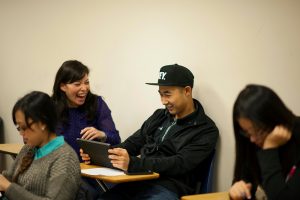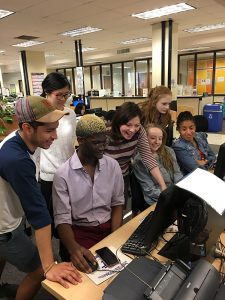Reflections on Being an Educator During a Pandemic: The Power and Importance of Stories
By Emily Rosado, Professor of English, Montgomery College
As a young college student in the 1990s, I was browsing through the clothing racks of Bloomingdale’s one day when I overheard a conversation between two employees who were roughly around my age. The mention of Jennifer Lopez perked my ears because at the time (and perhaps still), she was one of the few Latina women in Hollywood who had “made it”, a source of pride for “Boricuas” around the world. I don’t remember the specifics of the conversation, but I do remember this.
“That was stupid of her.”
“Well what do you expect, she’s Puerto Rican.”
I shot them the dirtiest look I could muster and then went home and cried. I realized that I would be fighting racial stereotypes for the rest of my life.
As a mixed Korean and Puerto Rican girl growing up in the 80’s, figuring out where I fit in wasn’t easy. Representation matters, and I didn’t know anyone else who looked like me or shared my struggles of identity limbo – the liminal space of growing up in a household with two very different cultures. In movies and on television, Asian women were often fetishized or surrendered to the submissive geisha girl trope – a prize to be enjoyed or even “rescued” by a man. The scarce appearance of Latina women was inevitably in the role of girlfriend/mistress to the Latino male character who was undoubtedly a drug lord or mafia boss. These narratives get internalized and for many, they subconsciously set the narrative for what we expect of ourselves as we navigate the murky waters of identity, representation, and race. The current crisis and the time spent rethinking my course delivery has pushed me to think deeply about the relationship between these internalized narratives and my role in combating them.
COVID-19 is forcing the pre-existing inequities of the student experience into a hot spotlight. How do we leverage this current momentum in our role as educators? How can those of us with similar experiences of marginalization amplify our voices and change that narrative for students while working within the current framework in which our representation is painfully disparate? What can we as faculty, with lives full of varied experiences, offer to students, colleagues, and administrators in a spirit of collaboration that is meaningful, inspirational, and authentic?
Stories. We can share our stories – ones that mirror the struggles our students face: the times we’ve felt out of place, marginalized, embarrassed, or hurt. Here’s my thinking. Sharing stories = increased empathy = a more just world. It wasn’t until Victorian era writer Charles Dickens, through his rich labyrinth of characters and their tragic experiences, that the educated public got a glimpse into the dirty underpinnings of British society. Injustices ranging from abuse, child labor, and exploitation of the poor were harder to ignore once audiences had the ability to relate to these characters on an emotional level. One of Dickens’ most notable characters, orphan Oliver Twist, was beaten, forced into child labor, and deprived of social interaction. “The fist had too often been impressed on his body not to be deeply impressed upon his recollection…” (Dickens). Descriptions of life for the young unfortunates of this era become much more graphic in detail as the story proceeds. Dickens wasn’t the first to expose injustices and highlight the need for social reform, but he was arguably one of the most tireless, earning him the title of “honorary social worker” (Andrews, 2012). His storytelling led to change. Each of us has a story to tell. In sharing and listening to those stories, our empathy grows.
Historian Lynn Hunt, in Inventing Human Rights, details how the popularity of fictional stories in the late 18th century allowed people to identify and empathize with people to whose stories they may have otherwise not been exposed.  “In reading, they empathized across traditional social boundaries between nobles and commoners, master and servants, men and women, perhaps even adults and children. As a consequence, they came to see others – people they did not know personally – as like them, as having the same kinds of inner emotions” (Hunt, 2007, 39-40). Is it a coincidence, then, that this time period birthed the creation of the United States Declaration of Independence (1776) and the French Declaration of the Rights of Man (1789)? How well are we, as a society, holding ourselves to those ideals?
“In reading, they empathized across traditional social boundaries between nobles and commoners, master and servants, men and women, perhaps even adults and children. As a consequence, they came to see others – people they did not know personally – as like them, as having the same kinds of inner emotions” (Hunt, 2007, 39-40). Is it a coincidence, then, that this time period birthed the creation of the United States Declaration of Independence (1776) and the French Declaration of the Rights of Man (1789)? How well are we, as a society, holding ourselves to those ideals?
Years ago, I assigned a poem in my literature course called “In Response to Executive Order 9066: All Americans of Japanese Descent Must Report to Relocation Centers” by Dwight Okita. The voice in the poem is of a 14-year-old girl, the protagonist, who writes a letter to the government explaining with a seeming naiveté that she’s aware she has to pick up and move. The girl describes how she always sat behind her best friend in class because of their last names: “O’Connor, Ozawa” (emphasis is mine). The author’s reference to an alphabetical coincidence mirroring America’s chronological history of oppressing immigrants is not lost on me. The poem takes a turn when the young narrator describes a scene:
“I saw Denise today in Geography class.
She was sitting on the other side of the room.
“You’re trying to start a war,” she said, “giving secrets away to the Enemy.
Why can’t you keep your big mouth shut?
I didn’t know what to say.
I gave her a packet of tomato seeds
and asked her to plant them for me, told her
when the first tomato ripened
she’d miss me” (Okita, 1992)
One of my students, a 23-year-old male named Carlo, told me that he cried after reading that. This is the power of sharing stories.
In a world where Big Data drives decision-making, we need to ensure that the everyday experience of our students is not lost in the shuffle. Twitter CEO Jack Dorsey recently announced that he is contributing $10 million to ensure that  every child in the city of Oakland has a computer and internet access (Serrano, 2020). A generous gesture indeed, but a temporary band-aid for a much deeper and more systemic wound. Let’s dig deeper and hear from those students. Let’s start a conversation about why those families don’t have internet access in the first place and the ways in which systemic racism is responsible for these inequities. As an educator, I have the opportunity to help my students tell their stories. Perhaps those of us in education need to engage in a more focused, global conversation on what our core values are and what each of our roles is in combating the injustices that COVID-19 is so powerfully exposing. We can start at the micro level and talk to the students in our classrooms. Ask questions. Be intrusive. Encourage them to share their stories and to find the commonalities interwoven among them. Model empathy for them and allow them opportunities to be empathetic with each other.
every child in the city of Oakland has a computer and internet access (Serrano, 2020). A generous gesture indeed, but a temporary band-aid for a much deeper and more systemic wound. Let’s dig deeper and hear from those students. Let’s start a conversation about why those families don’t have internet access in the first place and the ways in which systemic racism is responsible for these inequities. As an educator, I have the opportunity to help my students tell their stories. Perhaps those of us in education need to engage in a more focused, global conversation on what our core values are and what each of our roles is in combating the injustices that COVID-19 is so powerfully exposing. We can start at the micro level and talk to the students in our classrooms. Ask questions. Be intrusive. Encourage them to share their stories and to find the commonalities interwoven among them. Model empathy for them and allow them opportunities to be empathetic with each other.
Fortunately for you and me, we don’t need the gift of gab that Dickens had in order to reach an audience and effect change. This semester, I started my writing course with assigned readings and discussions on the importance of empathy as a workplace skill. Living through a pandemic has helped me realize just how important empathy is as a life skill as we all crave connection and seek shared feelings. I will continue to share my own stories and those of the oppressed in my classes to impress upon my students that they have a voice and need to use it. I will design creative assignments that encourage my students to find community and connection with each other but also outside of the classroom. Through social media networks, volunteer organizations, or student interest clubs, they can engage in sharing their truths and through that process, discover what’s important to them. There is an audience out there, yearning for candid conversations, lamenting suffering from the modern-day versions of societal ills. Start in your own classroom. Have honest conversations centered around empathy. Let’s enable each other a safe space to be vulnerable. It’s through the sharing of our lived experiences that we become energized to use our voices to call for a more just future.
References:
Andrews, A. (2012). Charles Dickens, social worker in his time. Social Work (57)4, 297-307. https://doi.org/10.1093/sw/sws010
Dickens, C. (2000). Oliver Twist. Ware [England]: Wordsworth Editions.
Hunt, L. (2007). Inventing human rights : a history (First edition.). W.W. Norton & Co.
Okita, D. (2012). In response to Executive Order 9066: All Americans of Japanese descent must report to relocation centers. In Schakel, P. J., & Ridl, J. (2012). Approaching literature: Reading + thinking + writing. Boston, MA: Bedford/St. Martins.
Serrano, J. (2020, May 15). Twitter CEO Jack Dorsey gives $10 million to Oakland schools’ tech equality initiative. San Francisco Chronicle. https://www.sfchronicle.com/bayarea/article/Twitter-CEO-Jack-Dorsey-gives-10-million-to-15272913.php
Professor Emily Rosado started teaching full-time at Montgomery College in 2007 and enjoys exploring themes of social justice in her English, literature, and journalism courses. Her teaching philosophy includes encouraging critical thinking by leading students in researching real-world issues such as worker’s rights, the stigma surrounding mental illness, and implicit bias. Professor Rosado serves on the Board of Directors of EveryMind, a mental health non-profit, and is currently researching generational trauma and education for her doctoral studies.
Linkedin: https://www.linkedin.com/in/emily-rosado-60474074/




A powerful and gorgeously written piece of pedagogy and inspiration, Emily! Thank you for sharing your personal and professional experiences. You found a way through the distance of distance learning to connect with your students and to bring them closer at a time when so much is pulling us apart. Especially loved that you looked at racism through Asian and Latinx lenses, and the poem was perfect.